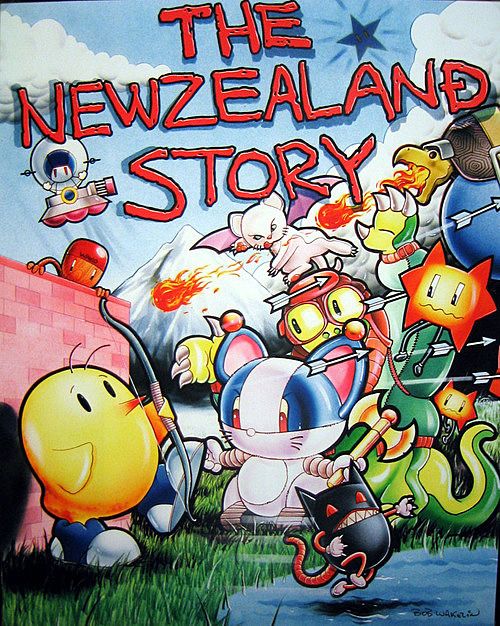The New Zealand Story?
Taika Waititi gave a talk a few weeks ago on the experience of writing Boy. It was great - he’s charismatic and funny and doesn’t take himself too seriously. The film itself is perfectly pitched and it’s one of the few I’m happy to consider a New Zealand Film. And this got me thinking about what defines The New Zealand Story. I can think of theatrical examples - Sophie Henderson and Curtis Vowell’s I <3 Camping, for instance - but literature is another story. I tend to shy away from New Zealand writers, actually, because there's something about the concept of writing The New Zealand Story that makes me cringe. It strikes me as inauthentic, a contrived mish-mash of kiwiana that I cannot relate to and which I secretly suspect very few can. I despise it when writers bandy about chocolate fish or marmite or pavlovas at the beach. Hate it, even when it's deftly done, and I know I'm being facetious and unfair but anything that overtly attempts to capture this idea of national identity makes me feel gross. In part I think it’s the product of being such a young country - of the fact that we're still in our late teens and struggling with our identity, so to compensate we exaggerate specific characteristics in order to anchor ourselves; to find a point of differentiation from everyone else and stake our place in the world. But like all teen identity crises, you just want to look away until they grow up a bit.
I’m reading Freedom by Jonathan Franzen at the moment. Time magazine recently declared him the Great American Novelist, and while the article is painfully riddled with weird references to otters and birds, it made the observation that:
Freedom is not the kind of Great American Novel that Franzen’s predecessors wrote — not the kind Bellow and Mailer and Updike wrote. The American scene is just too complex — and too aware of its own complexity, for anything to loom that large over it ever again. But Freedom feels big in a different way, a way that not much other American fiction does right now. It doesn’t back down from the complexity. To borrow a term from the visual arts, Franzen’s writing has an enviable depth of field: it keeps a great deal in focus simultaneously. Freedom is not just a domestic novel or a political novel. Franzen doesn’t chop the world up that way. Walter Berglund’s political and environmental passions began in his lousy childhood, which was a product of the history of his family, who emigrated from Sweden, and the vagaries of the economy, which are in turn fatally bound up with the health of the environment, and so on.
And I think this complexity is key to any story, and to ours. Of course, that still leaves us with the question of what defines a New Zealand Story and, more broadly, the zeitgeist of our times. For me, personally, a lot of it boils down to a certain brand of awkward humour and a laid-back approach to life that, at times, verges on passivity. What do you all think?
—
Edit: responses included here due to disqus being an asshole in the website shift:
Ryan: Stray Thoughts and Nosebleeds by Duncan Sarkies is the only Kiwi book I’ve read and thought, “Ah yep, there I am, and there’s people I’ve met.” And that will probably remain the case until the highly anticipated novelisation of Steel Riders.
Something I loved about Eagle vs Shark was the sort of showcase of New Zealand running in the background, what New Zealand was to me, growing up – eating fish and chips from the bag while walking past public toilets painted with a sea/sky/seagulls mural, tents in the backyard near the clothesline, potluck lunches with the folks from church. But that was nostalgia, and life’s not like that for me any more.
I don’t know. Any spirit of New Zealand has to take into consideration the nation’s youth, the background sense of not really completely having conquered the land and maybe there are some forests and hills here and there that still resent us, our isolation from the rest of the world simultaneously making us feel irrelevant and special, vague fears that we’re just a downed satellite link away from turning into Pitcairn…
Maybe that’s just me. I don’t know what I have in common with other New Zealanders besides geographical location, language, etiquette and some political values."
Jonny: "I still think some of the classic symptoms of New Zealandness hold true today. We’re still a small island in the middle of nowhere and that contributes a sense of isolation, or that there’s something bigger and more important out there that it would be, perhaps, unpatriotic to pursue.
The important thing here seems to be the willingness of New Zealanders to embrace a cultural identity that is changing in a world whose borders are not so important anymore. It means not clinging to the things that may have been important to us in the 50s and 60s and being able to see the bigger picture while it emerges.
In America, that seems easy. America was once a country built on industry, on small town community, and then fell into a depression. The culture that emerged unified the nation, meaning industry was now concentrated in centres of economic production. The quest of the young American became the need to in the Right Place, which required travel, which underpins the ‘American Roadtrip’, leaving behind desolate townscapes that set the scene for the ‘American Smalltown’. The fact that America has begun to redefine itself in literature is an indication that those old moral, religious and constitutional values have changed.
I don’t imagine New Zealand’s values have changed dramatically in the last 100 years, but we’re certainly better travelled and better connected. As a side effect, the uniqueness of our identity has probably dissipated, at least in the main centres. In Boy, Taika Waititi opens us to a small town world that has stayed more or less the same. It’s quaint, but at a personal level, that’s not the New Zealand I think of.
For me, New Zealandness is everything that comes of a sense of isolation - an inherent awkwardness of character, difficulty saying what we *really* want to say (which results in that strange, dark humour), an underlying question of whether a life elsewhere might be more exciting, but a naive sense of pride and loyalty that makes us feel connected to the land/geography (and also that awful Kiwiana you mentioned - I think that stuff is important, but it’s the doggedness with which we still cling to it that I find useful, not the objects themselves)."
—
[When I image searched ‘The New Zealand Story’ it came up with the above. Amazing. Apparently it’s a 1988 arcade game starring a “sneaker wearing kiwi called Tiki… the aim of the game is to rescue several of his kiwi chick friends who have been kiwi-napped by Wally, a large blue walrus”. There is a turtle blowing fireballs!! A marshmallow alien in a spaceship! Holy smokes you guys. Maybe THIS is the true New Zealand Story??]

